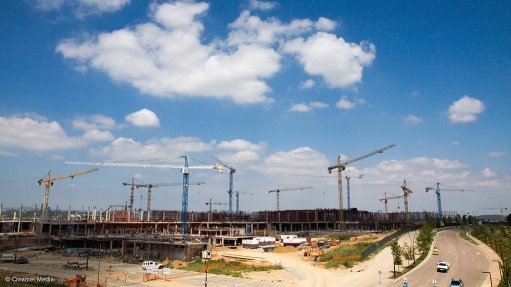
Photo by: Duane Daws
The global multidisciplinary construction industry has been under growing pressure and the situation is no different in South Africa, says a Frost & Sullivan study, titled ‘Analysis of the South African Multidisciplinary Construction Industry within an African Context’.
The study looked at the top 12 heavy construction companies with experience in mining, processing plants, and project management within sub-Saharan Africa for the 2015 financial year.
It noted that the eight publicly listed South African engineering, procurement and construction management (EPCM) companies analysed in the study, witnessed an average decrease in market capitalisation of 31% over the 2015 financial year.
These companies also saw an average decrease of 52% in market-to-book value from 2011 to 2015, indicating a significant drop in investor confidence. (The market-to-book financial ratio measures the market value of a company relative to its book or accounting value.)
The four remaining companies forming part of the analysis are international businesses with a reputation for delivering projects in Africa, two of which are not publicly listed companies.
“Despite the resounding growth experienced in the build up to the 2010 FIFA World Cup hosted by South Africa, the construction industry is currently witnessing a major slump as construction companies face several challenges both locally and globally,” says Frost & Sullivan chemical, materials and food (CMF) industry analyst Lynessa Moodley.
“Challenges include employee relations, lack of skilled labour and liquidity risk resulting in poor overall financial performance of the sector. Increased competition also restrains company profits due to price wars.”
The South African construction industry was hindered by slow economic growth in 2015.
A weakening exchange rate caused a rise in the import costs of raw material, as well as transportation and project prices, notes the Foster & Sullivan study.
“This stalled the demand for EPCM work, thereby reducing profitability.”
However, Frost & Sullivan expects that the current state of the industry is not expected to remain as such in the long term, owing to the South African government’s National Development Plan and increased social infrastructure spend, resulting in a temporary surge in the market.
The 2022 Commonwealth Games is also anticipated to contribute to the boost in market growth.
“In order to overcome the current challenging market conditions in South Africa, EPCM companies need to look at alternative markets in Africa where a growth in demand is expected for infrastructure projects and EPCM services,” says Frost & Sullivan CMF research analyst Kimberley Bryant.
“EPCM companies are advised to establish a strategy that encourages trade and business interaction between African countries and focus on the developments related to this network to bring in revenues.”